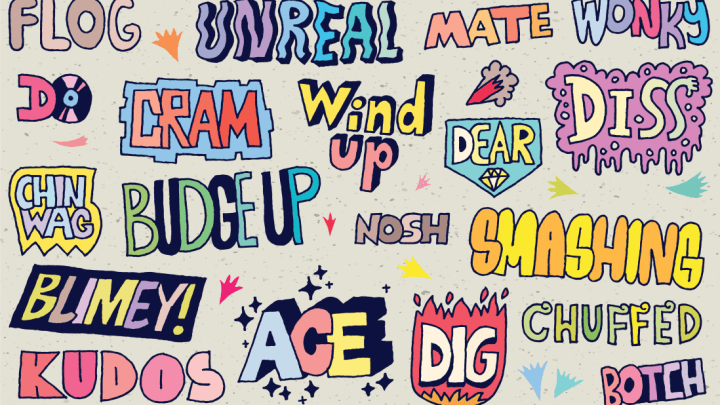It’s possible to get the pants from too much honeyfuggling. Spark some conversation with these vintage and regional terms.
1. The Term: Hurkle-Durkle
The Definition: According to John Jamieson’s Etymological Dictionary of the Scottish Language, 200 years ago to hurkle-durkle meant “To lie in bed, or to lounge after it is time to get up or go to work.” Basically, that urge we all fight every weekday morning.
2. The Term: Got the Morbs
The Definition: A phrase from 1880 meaning “temporary melancholia,” according to Passing English of the Victorian Era.
3. The Term: Stubby-Holder
The Definition: An Australian slang term for an insulated beverage holder. (A stubby is Aussie for a 375-milliliter bottle of beer, by the way.)
4. The Term: To Poke Bogey
The Definition: A 19th-century slang word for tricking someone. No one’s quite sure where the phrase came from, but it could have its roots in words for ghosts—bogey as in bogeyman, and poke may be related to an old English word for spirit.
More Articles About Slang:
5. The Term: Lizzie Lice
The Definition: According to Eric Partridge’s A Dictionary of the Underworld, this term for a policeman who patrols in cars dates to the 1930s. You might not want to use it when you get pulled over, though. (Rat bag, for a plainclothes detective, may also be unwise.)
6. The Term: Peerie-Winkie
The Definition: Peerie is an old Scottish word meaning “little,” and a peerie-winkie is the little finger or toe. If you’re looking for a fun way to refer to your hands, use the word daddles.
7. The Term: Got the Pants
The Definition: This phrase, according to Passing English of the Victorian Era, means “panting from over-exertion.” After you take the stairs, you get the pants!
8. The Term: Toad-Strangler
The Definition: Those who live in the Gulf states are probably familiar with this term that describes a sudden, and heavy, rain.
9. The Term: Honeyfuggle
The Definition: This word technically means to deceive or to cheat, but according to the Dictionary of Regional American English, it’s also used for public displays of affection.
10. The Term: Whooperups
The Definition: A Victorian term for “inferior, noisy singers” that is just as applicable at modern-day karaoke joints.
11. The Term: Degomble
The Definition: The Antarctic Dictionary defines this as “to disencumber of snow,” usually when coming in from outside.
12. The Term: Play at Rumpscuttle and Clapperdepouch
The Definition: This 1684 phrase has nothing to do with playing games and everything to do with, uh, getting it on. You can also play at rantum-scantum (1667), couch quail (1521), or tray trippee of a die (1660).
13. The Term: Abstain from Beans
The Definition: Here’s one to keep on hand during family gatherings: According to Green’s Dictionary of Slang, this is a phrase meaning “to desist from politics.” As Plutarch explained in the circa 110 CE book Of the Training of Children, the term meant “to keep out of public offices” because “anciently the choice of the officers of state was made by beans.” Literally or figuratively, it’s probably a good rule for parties.
14. The Term: Cwtch
The Definition: A very Welsh term for a hug that makes you feel warm inside. (It rhymes with “butch.”)
15. The Term: Hand in One’s Dinner Pail
The Definition: Well, maybe you don’t want an occasion to use this phrase, at least in its original meaning—it’s slang from 1937 for death. Later, the phrase would come to mean “to resign from one’s job; to stop what one is doing.”
